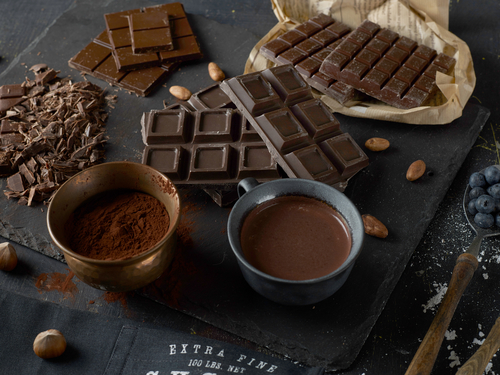
Struggling with a sweet tooth? When it comes to treats that won’t decay your teeth, chocolate is the right way to go.
We’ve talked about chocolate being better for your smile before, but as we head into the sweet-filled holiday season it bears repeating. Make this Halloween the one when your kids don’t harm their teeth in pursuit of candy.
As your dental professionals, we sympathize with trying to find a realistic middle ground between eating healthy and finding some joy in your daily eating choices. But chocolate is one great way to enjoy yourself and still keep your teeth in fighting shape. We’ve put together some details on chocolate’s best properties below – plus some other tips on choosing sweets that are better for your enamel (and your waistline).
Remember, we’re not saying that you can switch over to a chocolate-based diet – but there are worse choices you could be making for your teeth. Check out our dentist-approved sweet-eating tips below.
Why Chocolate Can Benefit Your Smile
Chocolate could actually help prevent tooth decay. That’s a far cry from most sweets, which are actively harmful for your smile. So what is it about the cocoa bean that makes it so special?
The cocoa bean itself, rather than the added sugar, is what makes chocolate a powerhouse. Cocoa beans contain antioxidants that are beneficial to your mouth and teeth. Tannins, polyphenols and flavonoids are the nutrients in question. Here’s what they do for your dental situation:
- Tannins – Prevent bacteria from sticking to your teeth to reduce instances of decay
- Polyphenols – Neutralize the microorganisms that lead to periodontal disease and decay, and also help prevent bad breath
- Flavonoids – Slow the progress of tooth decay
These are pretty remarkable abilities – is chocolate secretly a superhero? While it may look good on paper, remember that translating this to reality means choosing the right kind of chocolate. You want to go for the chocolate that is the least processed and has retained as much as possible of the cocoa bean. So between dark chocolate, milk chocolate and white chocolate, you can probably guess which is the best.
Aim for chocolate that is around 70% cocoa for the best health-boosting results. You don’t need to buy super fancy or expensive chocolate bars to get the most ideal cocoa component (although those artisanal chocolates are available in spades at Whole Foods) – bigger brands like Hershey’s, Ghiradelli and Lindt all have options with between 60-90% cocoa. Dark chocolate also contains less sugar than other varieties, which means it’s also a better option for your entire body.
We know that you might not necessarily be the biggest fan of dark chocolate due to its comparatively more bitter taste (when considering it against milk chocolate – white chocolate does not actually qualify as true chocolate and does not have the same health benefits). But if you start trying it more often, and choose dark chocolate that also contains dried fruit or nuts, we bet you’ll find your tastes changing as you appreciate the richer, subtler flavors.
Chocolate’s Other Health Benefits
Let’s get more detailed about exactly how chocolate benefits your teeth – because understanding this will help you see how it might actually impact your whole body.
There are many different types of bacteria in your mouth – some good, and some not so good. One of the bad guys is called oral streptococci, which creates acids that eat away your your enamel and erode your teeth. The antioxidants in dark chocolate that we mentioned earlier help inhibit the bacteria and prevent them from turning into acids. Cocoa butter also coats your teeth to help stop plaque from attaching.
Chocolate has a significant amount of antioxidants – actually about 4x as much as green tea. This means that it can not only prevent plaque from forming, but help reduce inflammation in the body. This may reduce your risk of developing periodontal disease, and may also help with heart health. Heart disease is due to a variety of factors, and inflammation may be one of them, so avoiding it is key.
Consuming in Moderation
Chocolate is not a cure-all – it’s sad but true that you’re never going to find a sweet that’s safe to eat anytime you like. Chocolate still contains significant sugar and fat, which are harmful to your health in excessive amounts. It’s also laden with calories. If you’re trying to aim for a healthy daily intake, the recommendation is 1 ounce per day (about 6 Hershey Kisses). But this small amount can still contain as many as 150 calories.
Moderation is always important, no matter what it is that you’re snacking on. Try to keep a minimal amount of sweets in your home so that there’s a reduced risk of binging, and always keep portion control in mind.
Have questions about your own diet and how it could be more tooth-healthy? We’re always here to help – just get in touch.
Hinsdale General Dentistry | General Dentist Hinsdale | General Dentistry Hinsdale